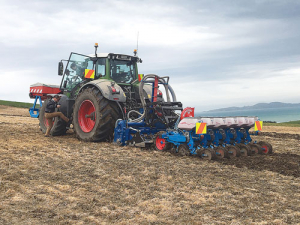Vendro badged tedders
Masterton based Tulloch Farm Machines has introduced a new series of Krone tedders badged Vendro, to replace the existing KW range.
 South Canterbury agricultural contractor is impressed after just one season using a Strebel SAG 16 strip tiller.
South Canterbury agricultural contractor is impressed after just one season using a Strebel SAG 16 strip tiller.
To farm more sustainably and profitably, many farmers and contractors are exploring the advantages offered by strip-tilling.
Tulloch Farm Machines is looking to meet this demand with a new strip tiller designed to work in pasture — the Strebel SAG 16.
Most crops require a fine seedbed for reliable germination, but traditional cultivation can damage the soil structure, while exposed soil can be eroded by wind or rain.
Strip tillers cultivate strips for a seedbed without disturbing the soil between them, so minimising soil damage and retaining moisture which have the potential to increase yields, reduce costs and ultimately result in healthier soil profiles less prone to pugging.
Tulloch Farm Machines’ Strebel SAG 16 is based on a subsoiler with rotary hoe blades on either side of the subsoiler leg.
The layout is said to break up the soil pan, while the hoe creates an ideal seedbed. The result is a shallow seedbed with shattered ground below, promoting easy root establishment with excellent nutrient and water flows.
Waimate contractor Josh Bleeker is into his first season with a Strebel SAG 16 strip tiller, after running other strip tillers for the past two years in his business Bleeker Ag Services.
“The Strebel is a better designed machine with a better driveline and is a lot easier to work with,” he says. “Where the cultivation occurs there is a more room for soil-flow, whereas with our other machine space is a lot tighter and prone to plug in wet conditions.”
By mid-December, driver Danny Walker had completed about 500ha of fodder beet and maize with the Strebel and was getting more requests from clients for strip tilling.
“We will do about 1000ha this year, building on the 800ha of last year, weather and time permitting” Bleeker says.
“Strip-tilling works well, as it cuts down erosion, particularly on the steeper ground prevalent in the area. The Strebel tiller does everything the crop needs. It creates a loose seed bed and fertiliser is incorporated into the planting zone. This has resulted in yield increases of 3 - 5 tonnes compared to traditional methods.”
Former Fonterra executive Alex Turnbull has been appointed CEO to lead all five Yili Oceania Business Division companies in New Zealand.
Fonterra executive René Dedoncker is leaving the co-operative later this year to lead Australian agribusiness Elders.
Alliance Group and the Southland Stags rugby team have joined forces in a partnership that will see the the meat co-operative's farmgate brand feature on players' team kits and replica jerseys.
Fonterra's plan to expand its organic programme to the South Island is being well received by farmers, the co-op says.
Voting has started for the renewal of DairyNZ's milksolids levy.
The most successful catchment groups in NZ are those that have 'a source to sea' approach.

OPINION: Here w go: the election date is set for November 7 and the politicians are out of the gate…
OPINION: ECan data was released a few days ago showing Canterbury farmers have made “giant strides on environmental performance”.